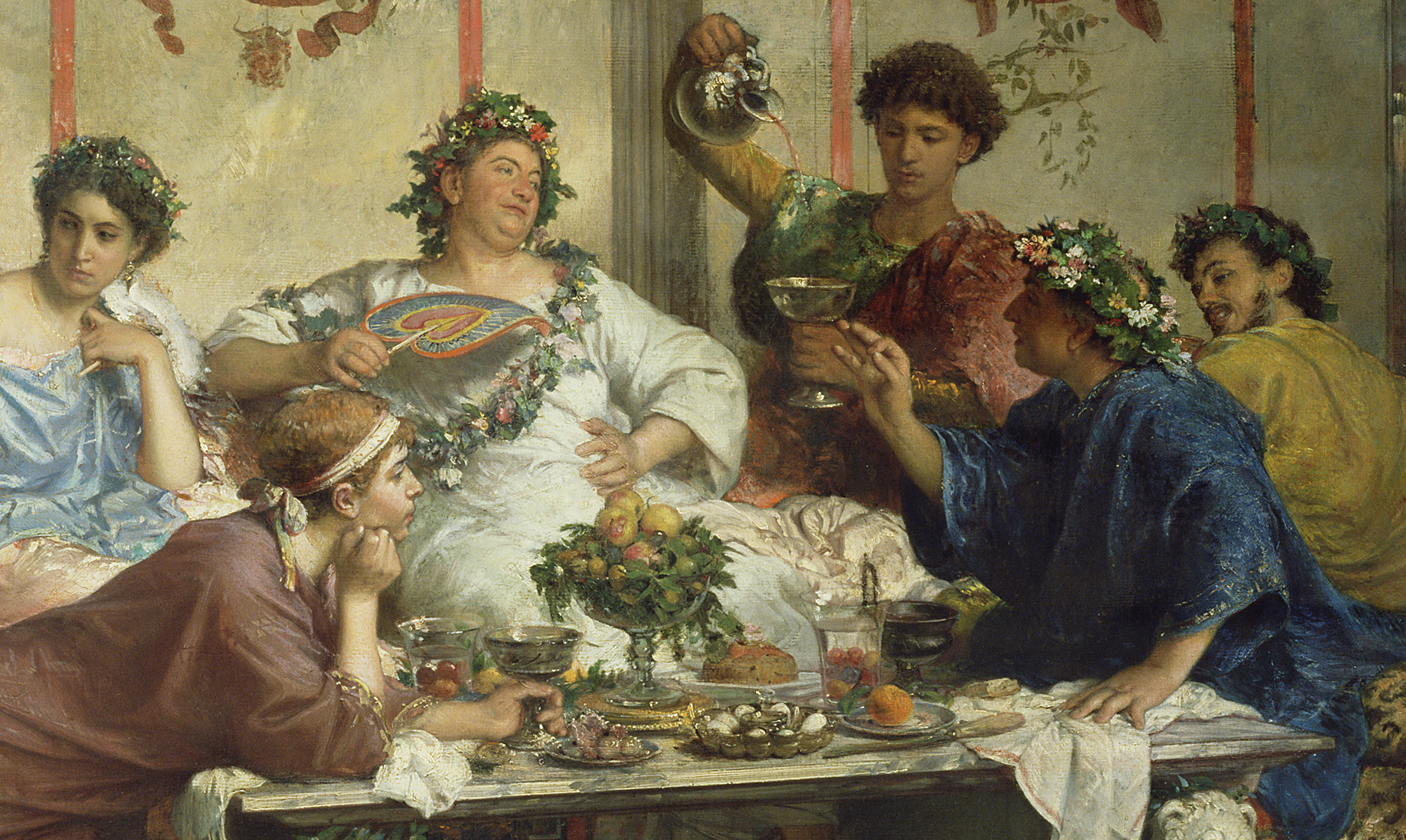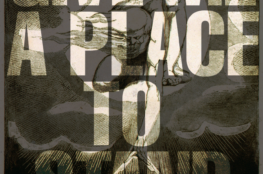The following on Armenia’s obsession with food and drink, to the exclusion of ethical laws, would naturally have found its place in the previous article after the paragraph which summarily declares that unlike Rome or Persia, Armenia never had an ethics or a set of laws. But due to the length to which it grew–proportional to Armenia’s love of binge eating–it was necessary to separate it and serve it as its own meal.–Hratch Demiurge
***
From the beginning until now, the only consistent principle I can find governing Armenian behavior is feasting. The ubiquitous banquet halls and their glut of food and drink that spring up wherever Armenians settle, far from being a new development, extends as far back as the available historical record. Herodotus in the late 5th century B.C. calls Armenians πολυπρόβατοι (polyprobatoi) that is, “rich in sheep” (5.49) the abundant meat of which sustained many a kebab feast straight out of Homer: “they roasted the outer meat, drew it off the spits, gave every man his portion, and feasted to their heart’s content” (Odyssey, Book 20). And surely the Armenian wine which Herodotus said was exported to Babylon down the Euphrates on canvas rafts (1.194) was also amply exported down Armenian gullets, washing down all that barbecued lamb.
What struck Xenophon most about his time in Armenia a short time later around 400 B.C was that everyone at every time was always stuffing their face and wouldn’t allow any guest to leave with their face unstuffed:
Everywhere he found them being very well fed and having a good time. There wasn’t a single village where they didn’t insist on setting a meal before them, and on the same table were spread half a dozen dishes at least, lamb, kid, pork, veal, poultry, not to mention various kinds of bread, some made of wheat and some of barley. And whenever a man wanted out of good fellowship to drink to another’s health, he would drag him to the big bowl, and when there, he would have to stoop his head and drink from it, sucking like an ox. (Anabasis IV 5.30, adapted from Dakyns and Brownson)
The saying goes, “When in Rome, do as the Romans do.” But when the Roman troops under Mark Antony were stationed in Armenia in 36 B.C., these Romans, now in Armenia, did as the Armenians did, which is to say they ate and ate until they had nausea, heartburn, indigestion, upset stomach and diarrhea, 2000 years too early for Pepto Bismol.
But after they were safely on the other side and had set foot in Armenia, as if they had just caught sight of that land from the sea, they saluted it and fell to weeping and embracing one another for joy. But as they advanced through the country, which was prosperous, and enjoyed all things in abundance after great scarcity, they fell sick with dropsies and dysenteries. (Plutarch, Antony, 49)
In the year 18 A.D. Tacitus says that the Pontic Greek prince named Zeno was the popular choice among Armenians both high and low to replace the previous king because he had endeared himself to them by copying Armenian customs. Which customs could these be? “He loved hunting and feasting and other barbarian pastimes” (Book 2.56, page 106). Hunting, it should be noted, is not a separate pastime from feasting, but one which only facilitates feasting. And it’s safe to assume the expression “other barbarian pastimes” used by Tacitus encompasses other feast-related activities, like games, since bread and circuses compliment each other so well. For his love of feasting, Zeno was made an honorary Armenian, and was crowned King Artaxias III (ibid.).
I’m almost convinced that Armenia was the first to adopt Christianity in 301 A.D. because its central mystery involves eating bread.
While they were eating, Jesus took bread, and when he had given thanks, he broke it and gave it to his disciples, saying, “Take it; this is my body.” Then he took a cup, and when he had given thanks, he gave it to them, and they all drank from it. “This is my blood of the covenant, which is poured out for many,” he said to them (Mark 14:22-24).
I can hear our ancestors now:
Haik: Did you hear the news?
Armen: What news?
Haik: There’s a new god in town. Some foreigner named Greg is really pushing him hard.
Armen: Greg? Didn’t Khosrov throw that guy into The Pit a long time ago?
Haik: He did, but it turns out some old bag was throwing him scraps of bread like a duck.
Armen: What a waste.
Haik: Speaking of which, that’s what the new god’s flesh is made out of.
Armen: What, duck?
Haik: No, bread. They say his flesh is bread and his blood is wine.
Armen: Right, and his hair is licorice.
Haik: Seriously, they have this ceremony where they give out free bread and wine to commemorate a feast he had before he was arrested or something.
Armen: Well, if there’s bread involved, then I’m listening.
Haik: I already converted this morning.
Armen: So what’s this god’s name?
Haik: Chris.
Armen: What kind of bread is Chris made out of: white, wheat, or does he have freckles like lavash?
Haik: It depends. For example, Germans think he’s white, Ethiopians think he’s wheat. But he’s whatever kind of bread you want, my friend.
Armen: Does any part of him turn into cheese?
Haik: Cheese? I don’t think so, but the other day Greg said “Get rid of the old yeast, so that you may be a new unleavened batch—as you really are. For Christ, our Passover lamb, has been sacrificed” (1 Corinthians 5:7). So I think he can turn into lamb too.
Armen: Oof, I’m sick of lamb. You know how many sheep we have?
Haik: But I’ve also heard that the Greeks call him “Ichthys” which in their language means “fish”. So maybe fish?
Armen: Fish, eh? I haven’t had a good salmon kebab in a long time…
The only rules I’ve ever come across that regulate anything in Armenian life relate to feasting. This from the Smithsonian Folklife Festival website:
The Rules of Feasting
1. Read up on the Armenian tradition of toasting and stock up on Armenian wine.
2. Prepare the ingredients for your feast. Try out new recipes and make sure everything is made for sharing. Make sure the table is always filled with food.
3. Invite friends and friends of friends to join you.
4. Elect a tamada, [1] or “toastmaster,” to rule the table.
5. The tamada gives the first toast, welcoming everyone and thanking the host. “Cheers” in Armenian is “Genats!”
6. If you invited guests to join you, the tamada offers them a toast as the guests.
7. Share food with the table.
8. While enjoying the feast, others offer toasts to elders, children, and the hearth—in that order.
Now coming to the present, a recent article in 2018 titled “Rewriting the Story of the Starving Armenian” one Armenian-American restaurateur tries to explain Armenia’s obsession with food by saying, “Our preoccupation with food is probably directly connected to our past, when people starved to death.” It’s easy to come to this conclusion, but as the weighty testimonies of Herodotus, Xenophon, Plutarch and Tacitus show, it’s absolutely not the case that Armenia is voracious due to recent deprivations during the genocide, dispersion, and its aftermath.
In ancient times, Armenians were thought to be gluttonous because we had a very fertile land that yielded abundant food. It was thought that with all that available food and with no place to put it, we had no choice but to store it in our throats like pelicans. But even now when Armenia is a poor country cut off on all sides from its own riches and its many flocks of sheep have been devoured by wolves, i.e. Turks, [2] the people still carry this same impulse, both there and everywhere in the world Armenians happen to be. This again is proof that a people’s behavior is rarely if ever the consequence of outside circumstances, but rather emanates outward from deep inside themselves. Too much emphasis is placed on the effect of the environment on individuals and nations. A creature can only adapt to an outward environment to which its internal environment already corresponds, at least in part. What the topography of the Armenian soul looks like is a separate discussion that will have to wait for another time and for a more appropriate place.
Footnotes
[1] Tamada is not even an Armenian word. It’s associated with Georgia and the people of the Caucasus generally, and ultimately seems to have a Persian etymology.
[2] This is not an insult, rather their own legends tell of their Turkic ancestors not only being cared for by a she-wolf like Romulus and Remus, which is natural enough, but that this wolf-reared progenitor of the Turks went one step further than the founder of Rome and had sex with his adopted wolf-mother, who later bore ten half-man, half-wolf creatures.
References
Plutarch, Antony, Translated by Bernadotte Perrin. Harvard University Press, 1920.
Homer, The Odyssey. Translated by Samuel Butler. A.C. Fifield, 1900.
Tacitus, The Annals of Imperial Rome. Translated by Michael Grant. Penguin Books, 1956.
Xenophon, Anabasis. Translated by C.L. Brownson. G.P. Putnam’s Sons, 1922.




